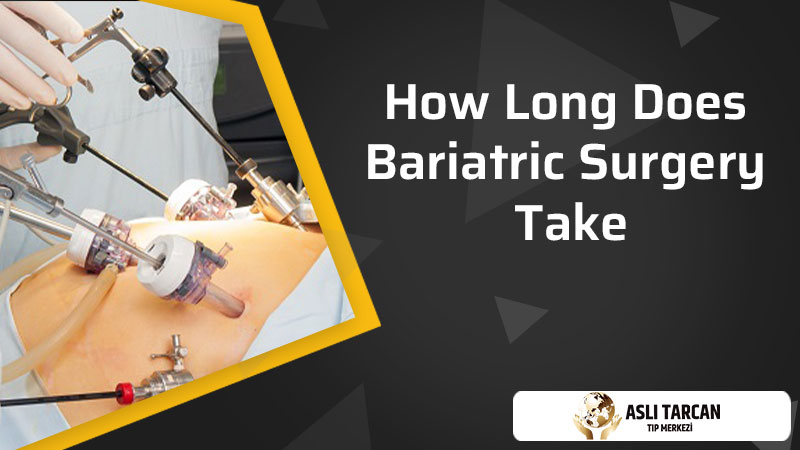How Long Does Bariatric Surgery Take Bariatric surgery has become more common as the fat culture has expanded. How Long Does Bariatric Surgery Take? Anyone who conducts studies on the subject and decides to have or undergo bariatric surgery is likely to have similar concerns. It’s tough to rely so much on the outcomes of surgery conducted by a variety of techniques, orientations, and physicians. This is especially important if you wish to lose weight. Due to mistakes and unskilled hands, the outcomes of bariatric surgery may be dismal. As a result, people’s opinions may not necessarily reflect those that care about the environment. We’ll look at the difficulties of surgery and fat culture in this article. Let’s start with a definition of obesity. What are the procedure steps? What is the risk level associated with these risks? Let’s take a closer look at this.
First, What Is Obesity?
What Is Obesity?
Obesity is a complicated illness. Also, the characteristic excess of body fat. Obesity is more than simply an aesthetic issue. As a result of this medical condition, you’re more likely to acquire other diseases and health concerns, such as heart disease, type 2 diabetes, high blood pressure, and some types of malignancy. There are several reasons why some people struggle to prevent obesity. Obesity is usually caused by a mix of genetic genes, the environment, and personal food and activity choices. The good news is that even minor weight loss can help or avoid obesity-related health issues. Weight loss can be aided by dietary modifications, increased physical activity, and behavioral changes. Additionally, prescription medicines and weight-loss surgeries are possibilities for managing obesity.
Symptoms of Obesity?
Straitgh, if body mass index (BMI) 30 or greater than it, your are an obese person. To calculate your BMI, multiply your weight in pounds by your height in inches, then multiply by 703. Alternatively, multiply your weight in kilos by your height in meters squared. BMI gives a fair measure of body fat for the majority of people. However, because BMI does not directly measure body fat, certain people, such as strong athletes, may have a BMI in the obese group while having no extra body fat. As a result, measuring body fat is always an excellent option for confirming obesity.
What About The Details Of Bariatric Surgery?
What Is Bariatric Surgery?
Gastric bypass and other weight-reduction procedures, known as bariatric surgery, entail modifying your digestive tract to aid in weight loss. Weight loss surgery is an option for those who have tried diet and exercise without success, or who are suffering from serious health problems as a result of their weight. Some therapies restrict the amount of food you can consume. As a result of other therapies, the body’s ability to absorb nutrients is compromised. Some techniques are capable of performing both tasks. All weight-loss surgeries, whether bariatric or not, have substantial risks and side effects. Determining the long-term efficacy of bariatric surgery also requires making permanent changes to your diet and engaging in regular physical activity.
Who Is For Bariatric Surgery?
If your body mass index (BMI) is 30 or greater than that, you are an obese person. To calculate your BMI, multiply your weight in pounds by your height in inches, then multiply by 703. Alternatively, multiply your weight in kilos by your height in meters squared. BMI gives a fair measure of body fat for the majority of people. However, because BMI does not directly measure body fat, certain people, such as strong athletes, may have a BMI in the obese group while having no extra body fat. As a result, measuring body fat is always an excellent option for confirming obesity.
The Variance Of Surgeon Risks!
Bariatric surgery, like any major treatment, has significant health concerns, both short and long-term. Excessive bleeding, infection, bad responses to anesthesia, blood clots, lung or breathing difficulties, leaks in your gastrointestinal system, and mortality are all risks. Also, surgical operation connected too with those risks. The long-term risks and consequences of weight-loss surgery differ depending on the procedure. Bowel blockage, dumping syndrome (diarrhea, flushing, lightheadedness, nausea, or vomiting), gallstones, hernias, low blood sugar, malnutrition, ulcers, vomiting, acid reflux, and mortality are all possibilities.
How Long Does Bariatric Surgery Take?
When considering bariatric surgery alternatives, it is understandable that many individuals question how long bariatric surgery takes. The simple answer is that most bariatric operations last between 60 and 90 minutes. The times mentioned are only recommendations; real surgery times can vary depending on your medical history, BMI, and unique anatomy. It’s also crucial to keep in mind that the surgical operation is only one part of a lengthy process. Continue reading to find out how long most bariatric operations take and what to expect from each operation.
The Definition : How Long Does Bariatric Surgery Take?
Bariatric procedures operate to accomplish weight loss by either limiting the quantity of food that a person can consume, inducing nutrient malabsorption, or a combination of gastric reduction and nutritional malabsorption. The majority of gastric bypass procedures are conducted utilizing minimally invasive laparoscopic surgical methods. You should think about the definition.
The Procedures : How Long Does Bariatric Surgery Take?
The processes, on the other hand, are crucial. The most well-known operation is the gastric bypass, which is regarded as the “gold standard” in bariatric surgery by the American Society for Metabolic and Bariatric Surgery (ASMBS). The surgery is known colloquially as gastric bypass, although the actual medical name is Roux-en-Y gastric bypass (often abbreviated as RYGB). During this form of surgery, the physician uses surgical staples to separate the top of the stomach from the remainder of the stomach. This results in a tiny pouch that can carry around 30 mL of food or drink. When the article directs you, it is always vital to read the warnings. And you can completely see why.
What Is The Final Result Of How Long Does Bariatric Surgery Take?
Yes, another operation in the final section. Because it does not require cutting the stomach or rerouting the intestines, the adjustable gastric band treatment is less invasive than gastric bypass and sleeve surgeries. The treatment works by restricting the stomach and inducing a feeling of fullness. The treatment is reversible and customizable. Many individuals are more familiar with the popular gastric band system known as LAP-BAND than with the band itself. Finally, it implies that the procedure will take around an hour to complete. It is changeable, but as you have learnt, as long as you read this post, it is typically one hour. Be your best, and we wish you successful days!
How Long to Recover from Tummy Tuck Does a Patient Take?
If you’re considering getting a tummy tuck Turkey, one of the most important questions you may have is, “How long to recover from tummy tuck does a patient take?” The first few days after your tummy tuck are usually the most painful and uncomfortable. You will likely experience swelling, bruising, and soreness in your abdomen. You may also experience fatigue and discomfort when standing or sitting. During this time, it’s important to rest as much as possible to allow your body to heal. Depending on your tummy tuck type, you may need to wear a compression garment for up to three weeks. This helps reduce swelling and provides support to the area.

You should be able to resume activities within one to two weeks after your surgery. However, you will still need to take it easy for several weeks. Avoid strenuous activities and heavy lifting for at least four weeks. Swimming and jogging should be avoided for at least six weeks. Your surgeon will likely provide specific instructions about when it’s safe to return to normal activities.

“How long to recover from tummy tuck does a patient take?” depends on the type of procedure you had, your overall health, and how quickly you heal. Generally, it takes four to six weeks to recover from a tummy tuck abroad Turkey.


